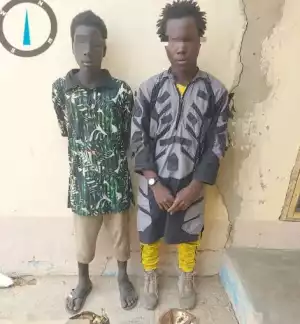SHOCKING!!! Over 900,000 Infected With Cholera Across Nigeria – Experts Insist

SHOCKING!!! Over 900,000 Infected With Cholera Across Nigeria – Experts Insist
About 400km northeast of the Nigerian capital Abuja, a two-year-old Mohammad Sheriff is on the road to recovery from cholera. The child sits with his father in MSF’s cholera treatment centre (CTC) in Bauchi, the capital of one of the states hit hardest by Nigeria’s worst cholera outbreak in a decade.

“He vomited twice and later started having diarrhoea,” says Mohammad’s father, who immediately recognised the symptoms as cholera.
“I told his mother that I’d take him to the hospital as we are constantly being informed through the radio that one should immediately go to the hospital when vomiting and diarrhoea starts.”
Cholera is simple to treat in most cases, and people with mild to moderate forms of the disease usually recover through treatment with fluids and oral rehydration solution. Severely dehydrated patients may need to be admitted to a CTC and be given fluids intravenously.
Mohammed’s case was serious, but after two days of receiving medical care in the CTC, he is now in the recovery ward – the last step before being discharged and returning home.
“If we had not come when we did, the situation might be very bad,” his father says.
Cholera is endemic in Nigeria, but the outbreak this year has been especially severe, with more than 90,000 people infected so far. While nearly all of Nigeria’s 36 states have reported cholera cases in 2021, the vast majority have been concentrated in the six northern states of Bauchi, Kano, Jigawa, Zamfara, Sokoto and Katsina.
The population of this region is already extremely vulnerable; hundreds of thousands of people have been displaced from their homes by conflict and violence, and most live in conditions with poor sanitation and no safe drinking water.
But the MSF emergency teams working alongside the Nigerian Ministry of Health are trying and bring the spiralling outbreak under control, opening six cholera treatment centres across the region and treating more than 20,000 patients so far.
In many areas, security poses an additional challenge. In Zamfara state, many patients arrive in a serious or critical condition, having delayed seeking treatment for fear of encountering violence or danger on the roads.
“Vulnerable populations in Nigeria were already in a dire situation,” says Dr Simba Tirima, MSF country representative in Nigeria. “Cholera has added to a complex web of medical and humanitarian vulnerabilities, coming on top of heightened insecurity, a chronic state of acute humanitarian and medical needs, and the direct and secondary impacts of COVID-19.”
At the peak of the outbreak in July, the Nigerian Centre for Disease Control reported more than 7,500 new cases per week and many medical facilities were at risk of being overwhelmed.
“We had to admit 80 or 90 patients during a single work shift,” says Anas Al-Hassan, a nurse at MSF’s CTC in Kano, where the outbreak spread quickly throughout the community. “There was no time for rest because of the number of patients. The work at that time was overwhelming.”
“The patients would come devastated, their caregivers worried they might not make it,” says Philip Esenwa, MSF medical activity manager for the Nigeria Emergency Response Unit. “Some were so weak they that they couldn’t speak.”
“We used to have patients who were brought in dead,”
Says MSF nurse supervisor Mustapha Mahmud, who also works at Kano CTC.
The challenges were immense in cities such as Kano and Bauchi, where many people live in overcrowded conditions, with dilapidated or non-existent sewage systems and no access to clean drinking water. Water sources can easily become contaminated with sewage, especially in the rainy season, causing waterborne diseases such as cholera to spread quickly.
“The areas with high numbers of cholera cases are congested, with no adequate ventilation or proper drainage,” says Mustapha Mahmud. “The sources of water are usually from shallow wells and boreholes; with rainfall, they become contaminated, and that is the water people here drink.”
Many medical facilities in these areas are also poorly equipped and were unable to deal with the surge in patients. Some medical facilities charge for their services, which put treatment out of reach of those who could not afford to pay.
In some states, a one-dose oral vaccine is available to help reduce the spread of the disease. However, global supply is limited and the vaccine is not available in all states.











![The Soul Reaper (2023) [Vietnamese]](https://www.memesng.com/r/storage.waploaded.com/images/6265edc20cfe45d2775177331c261ddb.jpg?w=50&ulb=true&ssl=1)










![Kaiju No 8 (2024) [Japanese] (TV series)](https://www.memesng.com/r/storage.waploaded.com/images/f10d0687b606ee67730d7d8a6c7fde01.jpg?w=50&ulb=true&ssl=1)


![Saint Seiya Knights of the Zodiac [Japanes] (TV series)](https://www.memesng.com/r/storage.waploaded.com/images/42f4b9d8a6184d29e6e7a6767ba73008.jpg?w=50&ulb=true&ssl=1)
![Go Go Loser Ranger (2024) [Japanese] (TV series)](https://www.memesng.com/r/storage.waploaded.com/images/3dcbdeec714c4c24bbb29c6ea912ede7.jpg?w=50&ulb=true&ssl=1)
{{comment.anon_name ?? comment.full_name}}
{{timeAgo(comment.date_added)}}
{{comment.body}}
{{subComment.anon_name ?? subComment.full_name}}
{{timeAgo(subComment.date_added)}}
{{subComment.body}}